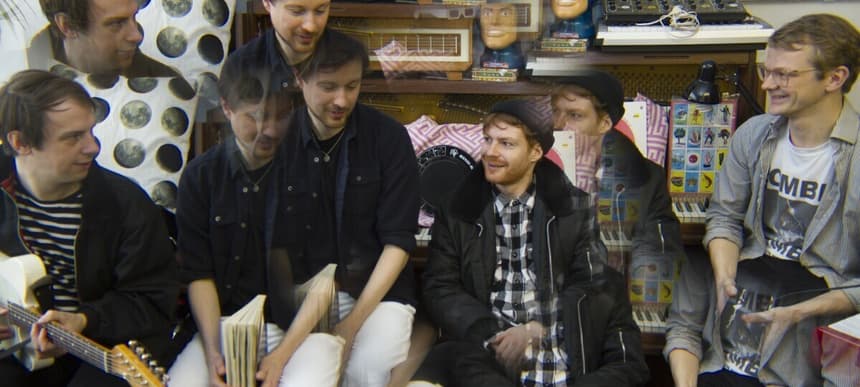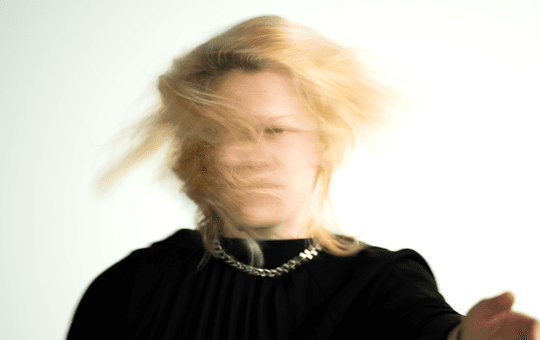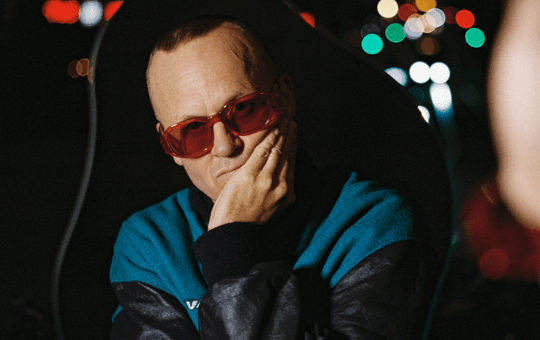
Django Django interview: "Brian Eno was also there, and he was this Zen-like character."
Dave Maclean is spending his final night before heading out on tour pretty low-key – “playing Street Fighter II on my PC” – before the release of Django Django's second album ‘Born Under Saturn’ and nine months on the road. Maclean has been anything but idle, however: creative opportunities since the release of ‘Django Django’ have included work with Damon Alban and the Africa Express, while Maclean and keyboardist Tommy Grace worked on The Royal Shakespeare Company’s production of John Webster’s The White Devil. Add to that the start of Maclean’s new label Kick + Clap and scoring tracks for the film Slow West, and it becomes clear that ceaseless energy and hunger to create is what drives Maclean: sitting down to play computer games on his downtime is hardly a crime.
In the ever-busy world of Django Django, the first hint of the follow-up to their 2012 self-titled debut appeared in January, the aptly titled First Light, advertised on the back of NME. “We didn’t want to make a song-and-dance about it,” he says, “We just wanted to put something out.” True to speed, the album had only been handed in to the label a month earlier – “literally the day before I went to my family’s at Christmas.”
‘Born Under Saturn’ sounds like the start of a new chapter for Django Django, scaled up in sound and ambition and showing no signs of the band slowing down.
You went to Mali with Damon Albarn and the Africa Express. Did the experience influence ‘Born Under Saturn’ at all?
Dave Maclean: "Nothing that you can put your finger on – it was more the experience of being around Damon, whose work ethic is very admirable. Also, being in such a rich culture of music was crazy. You talk about music being part of people’s lives, but this was an integral part of their lives from children to adults. As a drummer, it was exciting to see kids running around with these little drums, making up these amazing rhythms.
"Everything about it was pretty special – probably the best 10 days of my life, really. It was an eye-opener in so many ways. We spent our time in the capital, Bamako – it’s a strange city because it’s in a state of flux, struggling between the old way of doing things and the new path of progress, infrastructure, and technology. It’s quite an exciting and fast-moving city. There’s everything going on there; you could go to a tapas bar and then turn the corner to see a guy killing a goat to make a stew. It’s just a… kind of… erm…"
A microcosm of Mali?
Dave Maclean: “Yeah, definitely. And within that, music is interwoven into everybody’s lives – it’s just constant, fun, and friendly. I guess that’s something that you can’t help but come away with: the difference between Mali and Western culture is how we treat music as a business. Over there, there is no business in music. There was one studio with one amp and one microphone that reminded me of what I like doing. It also brought me some confidence in the way that I work, knowing that what I do is okay. The first album was recorded in the same way – it made me feel really at home there, and I was excited by what you could do with broken equipment."
"The difference between Mali and Western culture is how we treat music as a business. Over there, there is no business in music." – Dave Maclean, Django Django
Did you feel intimidated by your peers?
Dave Maclean: "Not at all. There were no egos, just people from different backgrounds finding music as a common ground. It kind of reminded me of how football is like an international language. Damon is so prolific and it’s quite contagious when you’re around him. On the way to studios, he’ll be coming up with melodies on a melodica, talking about what rhythms could be on it. He’s just always on it and it’s fun to be around. The enthusiasm rubs off on people – he’s a bit like this Pied Piper leading us all through. Brian Eno was also there, and he was this Zen-like character who kept a quiet authority."
Were there any similarities with your background and Mali's music culture?
Dave Maclean: "Yeah, there were the same sensibilities to what I’ve always worked with since I was a teenager with a four-track. Instead of having a sampler, we were trying to loop records and make beats. Everything I’ve always done has come from what was at hand. When we went to Angelic [Studio, where 'Born Under Saturn' was recorded], we ended up back in the corner hitting Coke bottles with the same old microphone we’ve always used – it’s just the way we work. I feel at home with that process; the playfulness and having to use your brain to overcome problems. If you need a kickdrum and you don’t have one, you tune a tom drum down a pitch and [pitch] vocals down for backing vocals. All these things are actually just quite fun to muck around with."
Is there’s a murder mystery of some sort on Shot Down?
Dave Maclean: "Shot Down was me and Jim [Dixon, bassist] coming up with an idea, like a film synopsis, of two guys robbing a bank and going into a Blood Brothers pact, though they’re both plotting to do the dirty on each other. The chorus shows one of the guys shot down in the dirt dying and he sees the other guy walking away, but he’s actually not dead and he’s already planning his revenge. It’s a bit like Carlito’s Way, where he doesn’t finish off his rival and it comes back to bite him in the ass in the end. It was just a fun little story that quite often happens when we’re writing lyrics – we’ll put a little storyboard or synopsis together with characters for everybody to hook on."
"Shot Down was me and Jim [Dixon, bassist] coming up with an idea like a film synopsis of two guys robbing a bank and going into a Blood Brothers pact, though they’re both plotting to do the dirty on each other. It was a fun little story that quite often happens when we’re writing lyrics – we’ll put a little storyboard or synopsis together with characters for everybody to hook on." – Dave Maclean, Django Django
Was there a big change to the writing process on this album?
Dave Maclean: "Yeah, massively, because [with the first album] it was me and Vinnie [Neff, singer and guitarist] on our own, meeting up at the weekends, doing little ditties and drinking beer. It wasn’t like we had an album to make, it was just something to do at the weekends – until we realised we’d made an album. This time around it was more of a conscious process. It made us move a lot faster."
Do you think the success of the first album is in consensus with the fact it was written in a bedroom, and that underneath the overall sound there was a DIY aspect?
Dave Maclean: "It could be an element of that. It’s always hard to tell, but I never wanted to push that [aspect] or tell people how it was recorded. I didn’t want that to get in the way of what people thought about it. But once people know that, then it probably changes their opinion of it a little. To me, having grown up with so many different kinds of music, it was irrelevant to me. A lot of the sensibilities of the record came from dance music, because before I met Vinnie I was sat in my bedroom making techno and getting disillusioned by it, wanting to work with songs more."
Did the approach change due to the foundations built by the debut?
Dave Maclean: "We’d never set a drum or mic-kit up before, so I wanted to do that and learn how to play the drums properly. It wasn’t that different from 'Django Django', but it was a lot quicker because we had a producer and engineer. Having him around gave us time to concentrate on the music and the writing. We didn’t want to spend another two years making a new record. The goal was to make it bigger and better, or step it up in the ways that we couldn’t do on the last record."
Would you say it’s ‘Django Django 2.0’, or are you operating in a different field now?
Dave Maclean: "Yeah, there was definitely some unfinished business from the last record. There were some tracks we discovered from the last sessions that we thought should be finished and put to bed, and we were happy to do that and concentrate more on the songwriting. Just stepping it up a bit was good enough for us."
"The title ['Born Under Saturn'] was nicked from a book. I bought it thinking it would be about occultism, but it’s a thesis on artistic temperament." – Dave Maclean, Django Django
Where did the title come from?
Dave Maclean: "As a group we’ve always been into the idea of escapist movies and art, but the title was nicked from a book. I bought it thinking it would be about occultism, but it’s a thesis on artistic temperament. It was more the title that grabbed me because it fitted the album’s cover that we had."
What’s the concept of the cover?
Dave Maclean: "It’s a statue called The Sluggard. A fan we follow on Instagram put a wine gum over its crotch, so asked if we could nick it, though she thought it wasn’t 'proper art'. I thought that tied in with the book’s ideas of idleness and artistic temperament – the irony of the amount of work that went into the statue [versus the fact that] it took two seconds to put that sweet on the image. We all studied art, so these kinds of ideas are funny to us."
I guess there’s a sort of censorship to it, too?
Dave Maclean: "Yeah, and the idea of making fun of censorship is humorous because in America they won’t put the promotional posters up – they think we’ve been disrespectful to art. They won’t put them up in the New York underground!"
Because Music released 'Born Under Saturn' on May 5th 2015 (buy).













